This story was originally published on Nov. 23, 2022. It was included in a year-end list of SI’s best stories of 2022.
AL HOFUF, Saudi Arabia – Inside what natives refer to as The Kingdom, two hours by taxi from the eastern border of Qatar, there’s a place not far from the World Cup that can also seem like it’s located a world away. Visitors will find a city of 150,000; an agricultural center that claims status as the date capital of the globe; and ancient souks, or bazaars, that peddle everything from spices to gold to handwoven textiles.
According to local legend, Al Hofuf is also the burial place of two fictional lovers, Layla and Majnun. Their love story was created as a poem and is the Arab world’s version of Romeo and Juliet. In it, Majnun is deemed too obsessive, Layla is married to someone else and Majnun becomes a hermit who spends every day writing poetry professing his adoration for Layla. Alas, they die before they can marry or even rekindle their romance.
The city and the story tie in perfect and random ways on Wednesday, starting with a Layla-Majnun drawing printed on a poster that someone slapped on a beige, brick building in downtown. Someone else stuck a World Cup sticker on the poster, covering Majnun’s face. And, in the dirt nearby, someone else planted the national flag.
The combination spoke to another love story. It’s a tale about a city and its beloved sport. It’s an account that’s antithetical to the billions the Saudi government has pumped into soccer clubs all over the world, through its Public Investment Fund, for sportswashing and relationship-forging and the kind of national pride that comes with heavy price tags.
Here in Al Hofuf and the neighboring suburbs, it’s impossible to traverse more than a few blocks without spotting a pitch. The surfaces vary: grass, turf, carpet, clay, dirt, even sand dunes. Some are padlocked. Some are fenced in. Some are guarded by towers and fences. Some are lit. One, during a Wednesday tour, even features couches with upholstery ripped to the padding and stained recliners stacked near each other to qualify as “stands.”
As the largest sports tournament in the world unfolds about 100 miles away, Qatar’s only neighbor accessible by land is not absent soccer history. In the previous eight World Cup tournaments, Saudi Arabia qualified six times. But it passed the group stage only once, in 1994, and collected all of three wins in five previous appearances, and two of those came in ‘94. Still, the Green Falcons have won three Asian Cups, two Arab Cups and three Arabian Gulf Cups. They also finished second in the FIFA Confederations Cup in ‘92.
Here, though, it’s not investment in well-known clubs in other places that seems to matter most. The national team can sometimes be the focus, when there’s a run or a day that demands a celebration, of which there have been few.
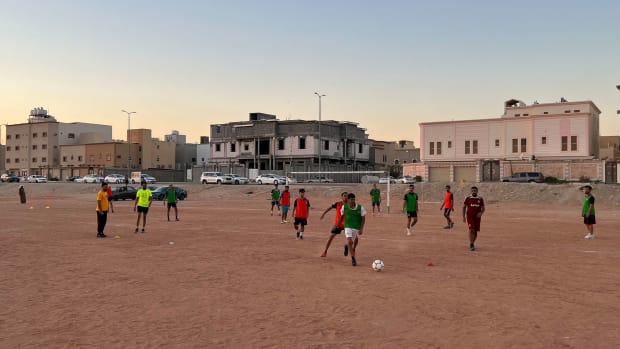
Greg Bishop/Sports Illustrated
Overall, though, in this city of soccer pitches, the beautiful game itself is the love story. Hence why, when King Salman bin Abdulaziz Al Saud declared Wednesday a national holiday, men who were no longer prospects still gathered to play on dirt and others squared off on dunes.
Their pitch is remarkable in how unremarkable it truly is. The surface is colored light red and pocked with pebbles. The sidelines are awash in broken glass. The men run and pass and dribble in red, green, black, maroon and neon jerseys, and they are happy, first to be playing soccer, which they do even while fasting when it’s Ramadan, before dawn or after nightfall. But they are also ecstatic, smiling and giggling like teenagers, for an epic event that took place the previous afternoon a country away.
“Yesterday, we proved we can win on any team,” says Abdulaziz Alfarhan, now 26 and once a soccer prospect.
He points at the row of houses beyond the field. The goalkeeper for the national team, Mohammed Al-Owais, grew up right over there. They were high school teammates and training partners, he says, and Alfarhan found Al-Owais friendly, committed and thoughtful, before the goalkeeper came to star in this epic moment.
Now, on a national holiday created maybe 18 hours prior, the teammate who inspired a country has also allowed his old friend to dream his favorite dream, which now seems just a touch more realistic than it did the day before.
“I was telling everyone,” Alfarhan says, as the sun dips below the horizon and the low sky turns bright orange. “The year is 2030.”
“We must have the World Cup.”
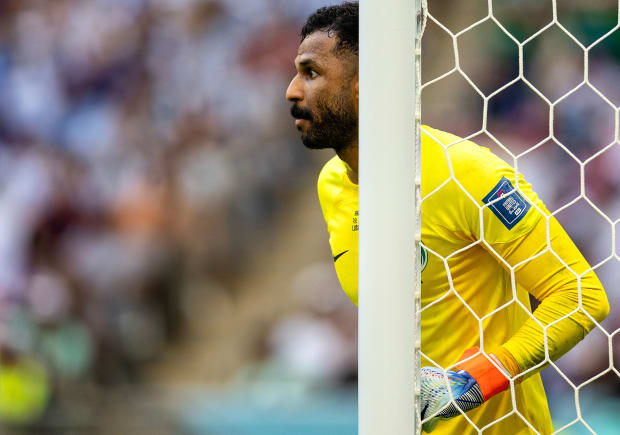
Simon Bruty/Sports Illustrated
Triumph arrived, seemingly, from nowhere, like a gift dropped from the sky by benevolent soccer gods. It was delivered on Tuesday in Qatar by a national soccer team ranked 51st in the world. It was handed to one of globe’s most powerful sides, Argentina, a tournament favorite led by an icon, Lionel Messi, playing in his fifth and ostensibly final World Cup. But this wasn’t the host country that furnished what some called the single-most shocking upset in World Cup history, with nearly a century’s worth of tournaments to choose from.
No, this was Saudi Arabia, a squad that falls somewhere between mighty and mighty mouse.
A precise comparison to American sports is hard to find. In the world of international soccer, consider the team that nationals refer to as Al-Suqour Al-Khodhur, or the Green Falcons, as neither power, nor underdog. Saudi Arabia is more a side that makes the World Cup in most cycles but rarely threatens and is satisfied with simply appearing and securing at least a point.
The country of Saudi Arabia, though, is home to more than 35 million people. Its land mass covers most of the Arabian Peninsula. Its government holds roughly one-fifth of the world’s known oil reserves, plus a GDP, measured last year, of $833.5 billion. Saudi Arabia is a founding member of OPEC and built the largest economy in the Arab States. And The Kingdom wants to exert its on-pitch power, too.
Tuesday didn’t seem like that day when the sun rose over the towers that fight for positions of prominence in downtown Doha. Argentina, the Green Falcons’ first foe, entered the tournament on an intimidating international streak, unbeaten in 36 straight—one shy of Italy’s record. La Albiceleste hadn’t been vanquished since before COVID-19 existed, its last loss coming in 2019. Sportsbooks gave Saudi Arabia 25:1 odds, and Argentina took the early lead, behind a first-half penalty from Messi.
Then something happened, something unexpected that failed to be captured in real time or real depth. It stemmed from perhaps the five-most-glorious minutes in a nation’s sports history. Moments that were made even-more glorious because few outside of the team, their most delusional relatives and true believers blind to green saw them coming.
Striker Saleh Al-Shehri scored first, in the 48th minute. Then, faster than millions of soccer fans could drop their jaws to the ground, winger Salem Al-Dawsari scored again. The latter, a comet off the right foot that hugged the top corner, will live forever in Saudi sports lore.
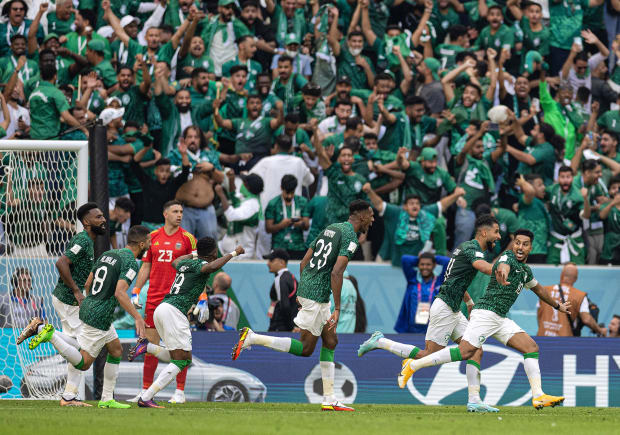
Simon Bruty/Sports Illustrated
Had there even been this kind of upset in World Cup history? Maybe Cameroon over the defending champion, Argentina, in 1990, when La Albiceleste were led by a star of Messi’s caliber in Diego Maradona. Maybe the U.S. over England (1950). North Korea dropping Italy (1966). Senegal shocking France (2002). Maybe all. Maybe not. Regardless, biggest upset or “one of few” hardly mattered. The South American champs fell – and not to a bad team, but also not to a great one.
Even the Saudi manager, Hervé Renard, a Frenchman with an elite jawline and perfect hair, sounded shocked. “This is football,” he said. “Sometimes totally crazy things can happen.” Like a national team that hadn’t scored two or more goals in one match since October 2021 doing exactly that against the third-ranked team in the world.
Anyone who didn’t take notice doesn’t follow soccer or own a television. Retired Canadian legend Dwayne De Rosario admitted to watching the upset, from half a world away, entranced. He saw the fans from Saudi Arabia who traveled across a border, by car but mostly by bus and perhaps even a few by air; saw their “passion and love for the game of football.” He saw a team that earned its place in World Cup history, too.
“They didn’t sit back,” De Rosario said. “It wasn’t fluke goals. It wasn’t luck. They played with full belief. Monumental win for them.”
Likewise, Don Garber, the commissioner of Major League Soccer, happened to be in attendance at Lusail Stadium. He noticed the same things: a stadium awash in green; the roars loud and sustained; the signs and chants and symbolism. “Amazing, inspiring,” he said. “As (Saudi Arabia) started scoring goals, (its fans) became more and more hopeful. It’s really what the World Cup is all about. To see one of the biggest upsets in the competition’s history is something I’ll never forget.”
That’s the thing, though. To the world, the upset seemed to come from nowhere. But not to the Saudis, who believe they know exactly where it came from. Who knew? A country that’s not really known for sports still has a soccer soul.
To get from Doha to Al Hofuf is like traveling anywhere in this part of the globe. The journey is just that, an amalgam of black camels strolling in the distance, border walls, desert sand, campers parked on the beach, a Saudi border guard who doesn’t simply grab his AK-47 but places his finger on the trigger, three separate taxis, seven checkpoints, two passport offices, Google maps, Google translate, a Qatari policeman from Iran hitching a ride to his car, a botched appearance with Don Lemon and friends on CNN This Morning and a sign that doubles as a mirage.
Welcome to The Kingdom of Saudi Arabia, it finally, mercifully says.
The first billboard upon entry reads, “Giddam,” which is the official name of the app for the Saudi Arabia Football Association and means, roughly, “No retreat in the upcoming mission.” After miles of sand dunes, and what seems like a much heavier police presence than in Qatar, with dozens of checkpoints along the highway, not to mention a series of bulldozers abandoned among the dunes, the sand out the window turns lighter, almost white.
Soon after that, Al Hofuf grows larger and more visible by the second.
For anyone wondering how a nation that bans alcohol can celebrate such a moment, that answer also becomes clearer as the miles accumulate. Huge rock formations jut from the desert in the distance. Gas trucks rumble down the highway, spraying sand. Abandoned buildings stand in lines, half finished, unoccupied.
Then, there it is. The first soccer field in the city of soccer fields. The road that leads to this particular field isn’t paved. The houses are more like shacks. There’s garbage everywhere, and stray dogs and cats hunting for dinner.
Taxi No. 3 speeds toward the city center. As it gets closer, signs of civilization appear – Baskin-Robbins, Dunkin’ Donuts, Domino’s Pizza; the comforts of home, apparently, regardless of where home might be. There’s another pitch.
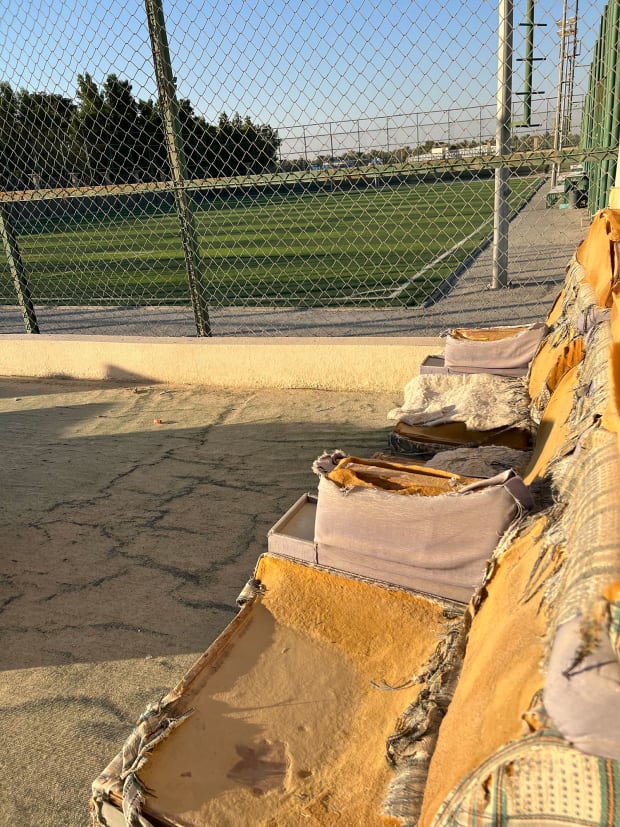
Greg Bishop/Sports Illustrated
Traffic becomes chaotic, with lanes and roundabouts and things like signaling mere suggestions as cars dip in and out, breaking and honking. Another pitch.
Teenagers goof off, riding two to a bike, with one peddling and the other standing on the seat behind them. None of them attended school this day. Yet another pitch. Then a small soccer stadium.
The trip into Al Hofuf is this, exactly, over and over and over again. Slaughterhouse, pitch. Delivery drivers, pitch. Falafel restaurant. Pitch.
How did Saudi Arabians celebrate an epic soccer victory? With more soccer, naturally.
Across the street from the light red pitch where the national team’s goalkeeper trained, there is a store that sells soccer gear from all corners of the globe. But in Souq Alriyadha, there’s no holiday. They’re working overtime to capitalize on the previous afternoon. The man behind the counter went to college at Central Washington, halfway between Seattle and Spokane. That morning, he sold out of national team gear. He got more. He sold out again. He got more, and the store is full, and no one is stopping by any racks for the famous clubs from Europe.
Infants here, the man behind the counter says, start indoctrination into the local sports obsession around “7 or 8 months” old. The passion that leads parents in that direction, he says, is “electric,” meaning it courses and powers and adds meaning and significance. He watched the Argentina upset on his phone, screaming inside the store.
A customer stops by the front counter. He’s wearing green, of course. Who isn’t? The customer came early that morning, to buy national team swag, but the man behind the counter had already sold out. The customer went to college at Michigan State, and he never understood why the locals were so fixated with hockey. He hailed from Saudi Arabia. Football, his version, is what he knew. His son is with him, trailing behind. The customer says the boy didn’t need this day, or the day before, to understand a city with a soccer soul. The customer attended his first national game while still in first grade. He can still remember the Asian Cup triumph, the country’s first, way back in 1984.
“We eat football. We drink football,” he says. “It’s our lifestyle. Our blood.”
He shrugs.
“Everybody here, they love soccer. It’s more rare when they don’t love it.”
He’s asked what kind of impact a victory of that magnitude might have, for both the soccer-fixated in Saudi and for the country overall. “Deep impact,” the man says, hinting at the forthcoming World Cup bid that’s reportedly to be shared with Egypt and Greece. “We have our vision, 2030, yeah. It’s coming, and this win will reflect what evidence we have that we will achieve our dreams.”
Was toppling Argentina the most significant moment in Saudi sports history? He stares back, incredulous, like someone just asked him the dumbest question in the world.
“Yeah,” he says.
Gulf proximity adds to the triumph, making it sweeter for some Saudis and, at minimum for others who insist they root for all countries in the region, more significant in terms of bragging rights. Most say they derive no joy from embarrassing stumbles in opening matches by both Qatar and Iran. They say that would be like rooting against the Arab world.
But don’t equate kind words in a society that values modesty and politeness in interactions, if not in actions, with peace in the Middle East. The Abu Samra border crossing that connects Qatar to Saudi Arabia is proof.
Before the tournament started, officials from both countries insisted travelers could speed between with ease, with facilities built on the Qatar side equipped to handle 4,000 visitors an hour. On Wednesday, it took one visitor an hour to navigate the byzantine maze all by himself.
This owes to the blockade that almost changed the World Cup. It started in 2017, when Saudi Arabia, Bahrain and the UAE accused Qatar of funding terrorism in Iran, which Qatar officials publicly denied. All severed ties (trade, diplomatic) with Qatar, and the crossing at Abu Samra closed, which meant much-needed construction materials and other supplies and food imports, which accounted for 40% of Qatar’s total, needed to be re-routed, costing time and money, while stoking deep resentment. None of the three severing countries competed in the ’17 Gulf Cup, held in Doha. The Saudis even threatened to dig a canal at the border, which would have effectively turned Qatar into an island.
More recently, tensions thawed. The blockade brigade sent all three national teams to Doha for Gulf Cup in 2019. That same year, Qatar and its neighbor clashed at the Asian Cup in what many called the “Blockade Derby.” And, also in ’19, government officials from Saudi Arabia and Qatar flew to The Kingdom for what was described as an “emergency” summit to discuss Iran, specifically.
On the ground in Al Hofuf, though, the soccer-mad natives wave dismissively at kings fighting other kings. Alfarhan, the soccer player who knows the national team’s goalkeeper, for instance, says that most of the Gulf countries are small in size and close in proximity, leading to blended families, friends all over and little daily consideration of geopolitics. He wants the soccer to remain pure and says that on-pitch rivalries between, say, his home country and Qatar, are more like that of Canada and the United States.
It's difficult to find anyone on that side of the border who disagrees with him. After nightfall, in the nearby suburb of Al Mubarraz, an open-air plaza is lit up neon, mostly green. National flags fly and flap, as dozens of families cram into coffee shops, fine-tailoring stores, the entrance shaped like a heart and lit up the same color as the flag.
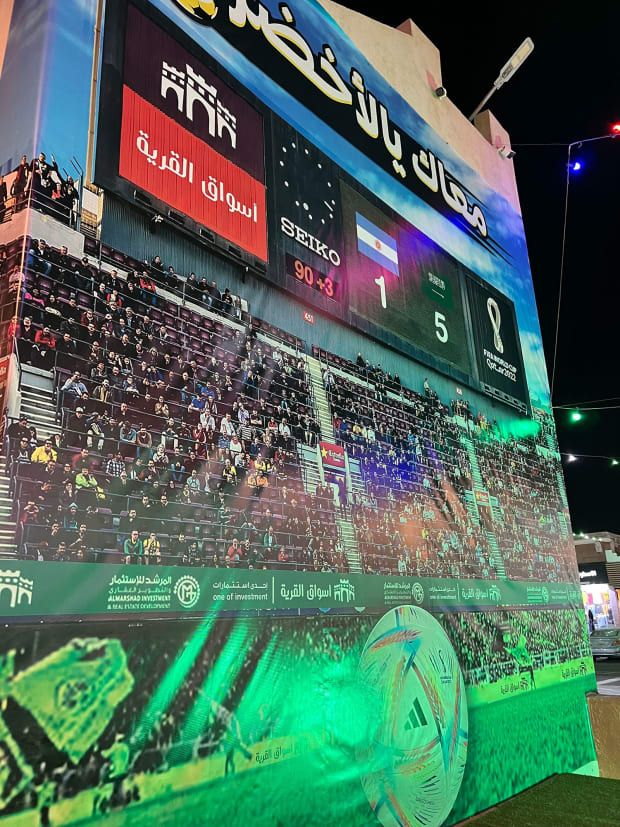
Greg Bishop/Sports Illustrated
There are hookahs to smoke and bouncy houses from which to vault, along with World Cup advertisements and the afterglow of triumph. Everyone seems delirious, which makes sense, after Tuesday and the most significant moment of their sporting lives. Music thumps. Incense wafts. And the city with the soccer soul tries to cling to what it can, to the fields and the game and the jerseys flying off the racks. There’s too much to unpack otherwise.
“This is our team, and we developed it ourselves,” says a man sitting with friends at a table outside. His name is Mubarak Al-Abdullah, and he says he can fetch the best prices in town for gold. He recalls Crown Prince Mohammed bin Salman telling the Green Falcons and their fanbase, before the World Cup started, “Don’t be scared. Don’t be afraid. Go there, and win!”
What does he hope the wider world understands about Saudi Arabia, after it announced its soccer progress on such a large stage? “They will learn that, if they do the best things, they win.”
On the way back to Qatar, a border guard reclines inside his chair in a booth. He’s watching Saudi Arabia highlights on his phone. Robert Lewandowski and Poland await on Saturday. But for now, the people of Al Hofuf prefer to focus on soccer as soul. To them, that’s where it matters. Even if, where it matters, that’s not exactly the point.
Welcome to the first World Cup held in this region, where moments and places and people can come across as pure and uncomplicated. Maybe they are. Maybe they’re not. But whatever comes across, even after an upset so epic it birthed a national holiday, is never exactly as it seems.







